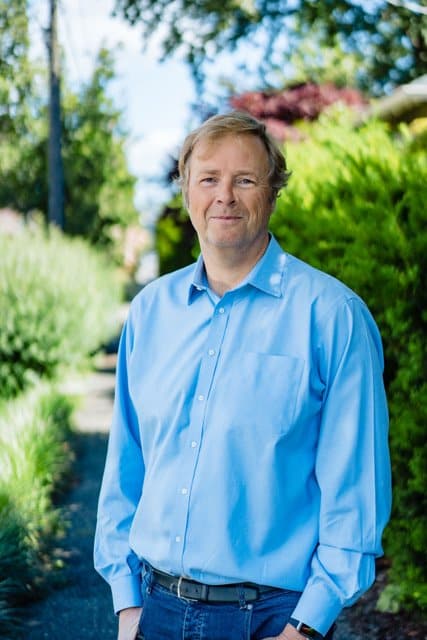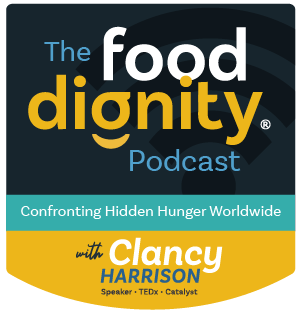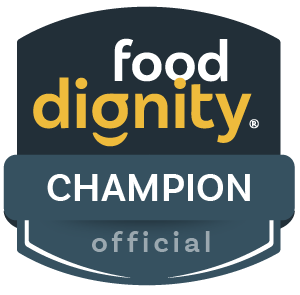Episode 140: NewImpact’s Original Approach to Food Access

About the Podcast
NewImpact is a nonprofit, humanity-benefit organization, focused on business model innovation. Most importantly, they try to help organizations to create models that are stronger, better, and more impactful. Today, Clancy and NewImpact’s founder, Jens Molbak, talk details about creating an equitable food system. Molbak’s nonprofit has some big ideas and projects to demonstrate their approach. You won’t want to miss this conversation!
About Jens Molbak
Jens Molbak is the founder of NewImpact, a humanity benefit nonprofit based in Seattle, Washington. NewImpact is seeking to change the way the world finds opportunities and solves problems by pioneering the field of Tri-Sector Innovation (TSI). Jens first realized TSI's potential when he founded Coinstar in 1990. His goal was to create a company that could simultaneously benefit the private, public, and non-profit sectors. Coinstar has now processed trillions of coins and billions of dollars for millions of people, raising over $150M in donations to nonprofits and saving the government billions of dollars, all while providing a valued consumer service and increasing spendable cash power. After the success of Coinstar, Jens realized tri-sector business models could be applied to many types of organizations, with the potential to help transform society. He and several food experts applied this methodology in Denver to build a food utility concept. He now promotes the food utility model to encourage adoption across other markets.
Discussion Takeaways
- New Impact is a nonprofit, humanity-benefit organization, focused on business model innovation. Most importantly, they focus on the people they serve. They try to help organizations to create strategies that are stronger, better, and more impactful. They do this in three ways:
- Build a mindset
- Build tools
- Advise oganizations
- New Impact’s approach stems from how Jen’s created Coinstar in the 1990s. This machine was an invention that supported a government coin recycling process, the corporate world in collecting coins at their various venues, and philanthropically through donating millions for nonprofits.
- Jens and New Impact’s method is known as “trisector innovation”. Basically, there are three sectors make up society:
- Private sector: This includes for-profit companies that make up 80% of our economy. Think of a grocery store.
- Social sector: This sector comprises the nonprofits trying to solve big problems. They’re funded through grants, donations, and other kinds of philanthropy.
- Public sector: This consists of taxpayer funded entities like cities; counties; school districts; local, state, and federal governments.
- Each sector is incredibly powerful and has unique, distinct resources. We need to think about the best resources that each sector has and utilize all of them for better solutions.
- Here is a clear example of the New Impact’s concept. We all live in a trisector world. A house is built by a private sector contractor. Water comes from a public sector utility. Fairtrade coffee is certified by a nonprofit.
- We should use a whole of society approach. Let’s think about solutions that involve the best of what the sectors have and stop thinking in silos.
- Nonprofits often fill holes between the corporate and government sectors. They often take risks that the government and corporations aren’t ready to do. Nonprofits tend to be innovative, try lots of pilots, and can then partner with others to scale.
- NewImpact has dug deep into the concept of a “food utility”. Public Utilities were created to address instances where market forces fail to provide essential services to everyone that needs them. Public utilities provided water and electric to everyone across the US.
- John Ilkerd, Professor Emeritus, Agricultural Economics at the University of Missouri has researched utility systems for years. They asked NewImpact to apply a utility business model to food. NewImpact was up for the job. While creating the model, NewImpact’s team searched for interested partners at all scales. They asked potential partners, “What would the world look like if everybody had fresh, healthy, high-quality food in their stomach 3 times a day, 365 times a year?”
- Here is the conceptualized preliminary idea for the utility. The goal is to incentivize people to eat healthily by providing a list of universal basic foods for free in grocery stores. A food utility will ask local communities to vote on a list of food items that they want available. These foods would have to pass a nutrition and sourcing standard. Then, food stores and food access locations will bid on whether they will be the ones offering that free food. The supermarket sector or other food distributers will pay the utility for the right to provide the free food. They’ll want to do that because it invites more people to their locations. Customers will join smart phone app so they can attain the free food. The more people join, the more the value of the food and data collection on the grocery outlets behalf increase. The selected grocers will ask for food producers who want long term contracts to provide the universal basic foods on their shelves. These foods will include universal basic food branding to drive out advertising and other costs. All the purchase data is required to be shared with the food utility and other partners. The utility will house a whole bunch of this data to use on behalf of us, the consumers. That makes the utility a very powerful player in the food system.
- An opportunity we think is out there for us in the 21st century is a commons no longer powered by labor, but powered by data. What if data is the fuel for a data commons, and as consumers we can start to own our data and have it serve us in a way that’s good for us, as opposed to bought and sold in a way that we don’t understand.
- If we can make the food system work better, we could refine so many things: food access, health, poverty, collaboration, and community.
- The Morgridge Family Foundation is working with Colorado Food Cluster to pilot this food utility throughout Denver. NewImpact is providing advisory support. We are hopeful that 5-6 food utility projects are stood up across the U.S. Jens and his team are ready and willing to discuss details with willing partners at any scale.
- The average person spends $5,000 a year on food and ½ is eaten in the house and ½ out. The thought is that the utility can drive the cost of food items down because food can be purchased in bulk locally, while cutting down on packaging, and truly supporting regional manufacturers.
- Part of the initial research needs to test if there is a chance that the utility could actually generate a profit and pay cash dividends back to the community they serve.
- NewImpact, and society, needs more food utility pilots and food utility funding. NewImpact thinks coalitions of willing partners regionally and coalitions of the doers are needed. NewImpact has listed the top 10 research questions they think should be addressed. The Denver team will tackle two of these questions, and we hope that there are other partners in Denver and nationally who will help answer more of them.
#1 tip to improve access to healthy food
- NewImpact thinks this could be some of the most transformative changes to the food system ever done. The end goal is so compelling that this has to get out there, and could radically change health outcomes, food outcomes, poverty outcomes and is a powerful model that needs to get out there to learn about it.

Each week on the Food Dignity® Podcast, the Food Dignity® Movement’s Clancy Harrison hosts a wide variety of hunger experts and other people making changes on the frontlines. Join us as we dive deep into conversations that will change the way you think about food insecurity.
Listen to our trailer!
Want to learn more about how we might work together?

Fight hidden hunger by becoming a
Food Dignity® Champion and take the HIDDEN HUNGER PLEDGE >


